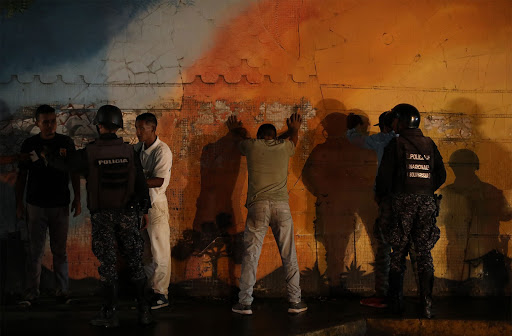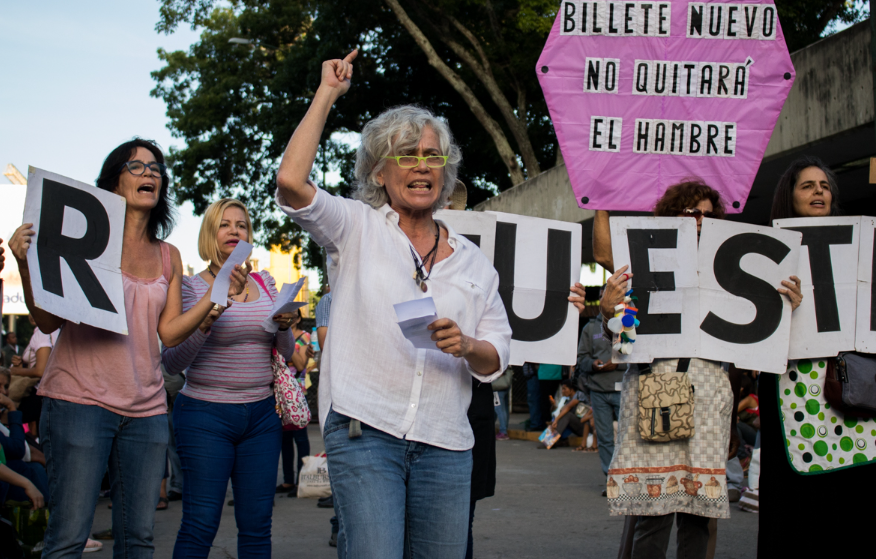The exceptional measures passed by the national, state, and municipal governments in the wake of the COVID-19 pandemic have implicated grave, arbitrary, and disproportionate limitations to the exercise of rights such as access to healthcare, adequate food, education, free movement, and information, among other things, whose consequences are reflected in an evident deterioration in the quality of life (in Venezuela).
This is highlighted by the Comisión Humanos del Estado Zulia (The Human Rights Commission of the State of Zulia, ie CODHEZ), in its May 2020 bulletin relative to the situation of human rights in the region.
CODHEZ points out that on May 12th the Ejecutivo nacional (National Executive) announced Decree No. 4198, which has extended the state of alarm set in place on March 13th for 30 more days. This enacts the second extension of this type of state of emergency, even though the regulation provided by Article 338 of the Constitution only allows for one 30-day extension.
Throughout May both the restriction of circulation and the measure of confinement were maintained in force, through the national decree (as in the case of Maracaibo), with the decree number 0036-2020. This situation, in light of the prohibition of the supply of gasoline for individuals, gravely impacted people with chronic illnesses that required ongoing treatments to preserve their health. These people have been adversely affected during quarantine by the impossibility of being transferred to specialized health centers.
Overview of the COVID19 Pandemic in Zulia
The rise of cases in Zulia has resulted in a health emergency declared on May 30th for the whole region, announcing that there would be rapid tests in all parishes (districts) of Maraciabo. As of that day, the number of positive cases in Zulia has been growing and the majority of cases are linked to the Las Pulgas market as the nucleus of the virus.
The facts reported in May highlight complaints from medical personnel in the Hospital Universitario de Maracaibo (University Hospital of Maracaibo) that request biosecurity implements for protecting themselves from infection of COVID19. Since the past month there have been reports of medical residents that have had positive results from the tests.
Moreover, CODHEZ notes that relatives of the people isolated in the Hospital Universitario de Maracaibo have reiterated complaints about the shortage of potable water in that hospital center, even though good hygiene and sanitation are the principal preventative measures of preventing the spread of COVID19.
At the same time, the relatives of the patients announced that they have asked permission for the admission of food and other products of first necessity, since, according to their testimony, the hospital lacks sufficient supplies for suitable nourishment, necessary care, and the recovery of those people. Also, various complaints have been reported regarding cases of asymptomatic people that were sent, in absolute isolation and without family contact, to city motels devoid of the minimal conditions that would guarantee their nourishment and care.
Arbitrariness and Detentions
CODHEZ informs that various cases of arrest were produced in May on the part of the bodies of public security without the existence of a prior court order.
In Ciudad Ojeda (Ojeda City), CODHEZ notes the detention of a person on April 30th for an alleged breach of the sanitary measures from the state of alarm decree and the publication on social media of complaints about the shortage of potable water for more than 30 days in the municipality. This detention happened without an arrest warrant. The following day, the person was set free after the Minesterio Público (Public Ministry) did not pre-qualify any crime.
Another of the registered cases is that of Andreína de los Ángeles Urdaneta Martínez, a medical resident associated with Adolfo D Empaire de Cabimas Hospital. She was imprisoned without an arrest warrant for the suspected perpetration of a crime of “incitement to hatred” against the President of the Republic through her publication of a Whatsapp status.
This past June 2nd, the Tribunal Primero de Control de Cabimas (the preliminary proceedings court of Cabimas) in the state of Zulia ratified the terms of imprisonment for 45 days while the investigation process proceeds.
Utilities without Solutions
In May, electrical rations were intensified to two times per day. In a period characterized by a hot and very humid client, the confinement has obligated people to remain at home without the minimum conditions of wellbeing. CODHEZ reported that sectors only counted on electricity for 4 to 6 hours a day, with rationing that could extend for 14 continuous hours.
The shortage of potable water in the region continues to be a constant. The measures implemented by the governmental authorities are circumstantial and improvised, as CODHEZ warns that the measures do not reflect the result of a consistent and sustainable public policy.
Such is the case of the delivery of 18 cisterns for the distribution of water in the Zulia region. According to the supply plan, in this method trucks will arrive at a main point in the sectors so that later their inhabitants can distribute the water house by house. For the organization, this solution doesn’t address the nucleus of the problem, as there should be the regularization of potable water that comes to homes through pipes, in a permanent and affordable way.
For CODHEZ, the current reality of Zulianos denotes an evident violation of the right to a decent standard of living. The routine of the people that live in this region is characterized by a cluster of shortages and instabilities, in light of the neglect on the part of the competent authorities who are limited to issuing circumstantial measures that are unsustainable over time, and that don’t give an appropriate answer to diverse needs.
The organization warns that the ignoring of the human rights of the Zulianos is made more grave and evident each day. For CODHEZ, while these precarious conditions persist due to (among other reasons) the deficient functioning of basic services, it will be impossible to realize any right, as the State is the principal one responsible for the persistence of these conditions, and the one that has to attend to their immediate resolution and improvement.
Maracaibo, June 7 2020
Translated by Hannah Sawyer




